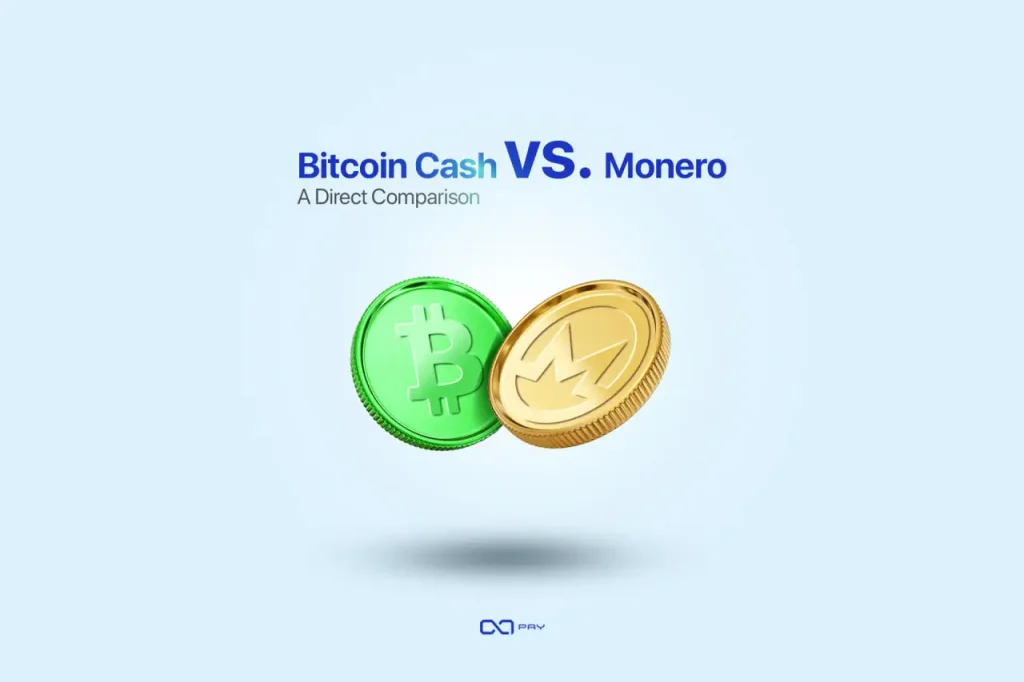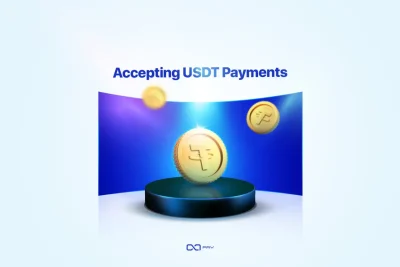Cryptocurrencies fall into two categories: private coins and transparent cryptocurrencies. Private coins focus on anonymity, concealing transaction details, while transparent cryptocurrencies record all transactions on public ledgers. This article explores their differences, compares Monero (XMR) and Bitcoin Cash (BCH) as leading examples, and evaluates their suitability for payments. We also highlight how OxaPay crypto gateway supports both, giving businesses flexible options for accepting crypto transactions securely and efficiently.
Private Coins: Ensuring Confidentiality and Security
Private coins are designed to protect financial anonymity by ensuring that transaction details remain hidden from public view. Unlike transparent cryptocurrencies, which store all transactional data on an open ledger, private coins use cryptographic techniques to mask sender addresses, recipient addresses, and transaction amounts. This ensures that third parties, including government agencies, businesses, or other individuals, cannot trace transactions back to specific users.
Key Characteristics of Private Coins:
- Full Anonymity – Users’ identities and transaction details remain hidden; therefore, linking payments to individuals becomes impossible.
- Untraceability – Transactions are mixed or obfuscated using cryptographic techniques, which prevents tracking.
- Fungibility – Since every coin holds equal value and history, no funds can be restricted based on previous transactions.
- Decentralization – Like other cryptocurrencies, private coins operate on decentralized networks, thereby reducing the risk of censorship.
- Enhanced Security – Advanced cryptography strengthens security, making it difficult for malicious actors to exploit transaction data.
Use Cases for Private Coins:
- Individuals seeking financial privacy – Users who prefer to keep their transaction history private so that it remains hidden from public view.
- Businesses handling sensitive transactions – Enterprises that must safeguard their financial activities to ensure confidentiality.
- Protection against surveillance – By shielding personal or corporate finances from unauthorized scrutiny, private coins help maintain financial security.
- Avoiding financial discrimination – They prevent governments, financial institutions, or third parties from blocking or restricting transactions, thereby ensuring financial freedom.
Notable private coins include Monero (XMR), Zcash (ZEC) and Dash (DASH).
Transparent Cryptocurrencies: Open and Verifiable Transactions
Transparent cryptocurrencies operate on public blockchains, where all transactions are recorded permanently and are accessible to anyone. Unlike private coins, these cryptocurrencies do not hide transaction details, allowing full visibility into the movement of funds. This transparency helps promote trust, regulatory compliance, and easy verification of payments.
Key Characteristics of Transparent Cryptocurrencies:
- Public Ledger – An open blockchain records every transaction, allowing anyone to audit it.
- Verifiability – Users can confirm the movement of funds, ensuring that payments are genuine and irreversible.
- Regulatory Compliance – Governments and institutions favor transparent cryptocurrencies due to their traceability.
- Low Privacy – Specific wallet addresses link to transactions, enabling tracking and monitoring..
- Accountability – Ideal for businesses and organizations that require an auditable financial record.
Use Cases for Transparent Cryptocurrencies:
- Businesses requiring proof of transactions – Organizations that need to verify payments, track funds, and maintain accurate financial records.
- Individuals making purchases with regulatory oversight – Users who must comply with legal or tax regulations regarding crypto transactions.
- Supply chain and asset tracking – Companies that use blockchain to ensure traceability and prevent fraud.
- Merchant payments – Retailers and online stores accepting cryptocurrencies for goods and services.
Examples of transparent cryptocurrencies include Bitcoin (BTC), Bitcoin Cash (BCH), Ethereum (ETH), and Litecoin (LTC).

Monero vs. Bitcoin Cash: A Direct Comparison
Monero (XMR) and Bitcoin Cash (BCH) represent two distinct approaches to cryptocurrency transactions, making them ideal for comparison. XMR is a privacy-focused cryptocurrency that prioritizes anonymity and confidentiality, making it ideal for users who need secure and untraceable transactions. In contrast, Bitcoin Cash is a transparent and efficient cryptocurrency designed for fast, low-cost payments with complete visibility on the blockchain. By analyzing these two coins, we can better understand the trade-offs between privacy and transparency in the crypto ecosystem.
Monero (XMR) – The Leading Private Coin
Monero is a cryptocurrency designed to ensure private and untraceable transactions.
Key Features of Monero:
- Ring Signatures – Blends a sender’s transaction with others, making it nearly impossible to track the source.
- Stealth Addresses – Generates unique one-time addresses for each transaction to protect recipients.
- Confidential Transactions – Hides transaction amounts from public view.
- Fungibility – Prevents coin restriction based on previous transaction history.
- ASIC-Resistant Mining – Uses RandomX to enable decentralized mining.
Monero’s Advantages:
- Unparalleled privacy for individuals and businesses.
- Transactions remain untraceable by blockchain analysis tools.
- Ensures financial confidentiality.
Monero’s Limitations:
- Not widely accepted on major exchanges due to regulatory concerns.
- Higher transaction fees compared to BCH.
- Slower transaction speeds due to privacy layers.
Bitcoin Cash (BCH) – The Transparent Cryptocurrency for Payments
Bitcoin Cash is a widely accepted cryptocurrency that enables fast, low-cost transactions with full transparency.
Key Features of Bitcoin Cash:
- Larger Block Size – Supports up to 32MB blocks, allowing more transactions per second.
- Fast Confirmation Times – Lower congestion results in quick transactions.
- Minimal Transaction Fees – Cost-effective for everyday purchases.
- Public Ledger – All transactions are recorded transparently.
- Decentralized Payment Network – Like Bitcoin, BCH operates without intermediaries.
Bitcoin Cash’s Advantages:
- Fast and inexpensive transactions make it ideal for merchants.
- Transparency allows for easy verification of payments.
- More regulatory-friendly compared to private coins.
Bitcoin Cash’s Limitations:
- Transactions are fully visible on the blockchain.
- Potential restriction based on transaction history.
- Less emphasis on privacy compared to Monero.
| Feature | Monero (XMR) | Bitcoin Cash (BCH) |
| Privacy | High (Full anonymity) | Low (Transparent transactions) |
| Transaction Speed | Moderate | Fast |
| Transaction Fees | Higher | Lower |
| Fungibility | Strong (Coins cannot be traced) | Moderate (Coins can be flagged or restricted) |
| Regulatory Acceptance | Limited (Some exchanges restrict XMR) | Broad (Accepted on major platforms) |
| Use Case | Privacy-focused transactions | Everyday payments |

Which One Should You Use for Payments?
Choosing between Monero and Bitcoin Cash ultimately depends on the specific requirements of your business or personal use case. To make an informed decision, consider the following:
Choose Monero (XMR) if:
- You prioritize privacy and anonymity in financial transactions.
- Your business deals with sensitive financial data that must remain untraceable.
- You want to avoid transaction monitoring by third parties, governments, or financial institutions.
- You require a fungible cryptocurrency where coins cannot be flagged based on past transactions.
Choose Bitcoin Cash (BCH) if:
- You need a fast and cost-effective solution for everyday transactions.
- Your business requires full transparency in payments and financial records.
- You want to accept widely supported crypto payments with easy integration.
- You need a cryptocurrency with low transaction fees for frequent or high-volume payments.
Final Thought
Both Monero and Bitcoin Cash offer valuable features, but their use cases differ significantly. If financial privacy is a top priority, Monero is the ideal choice. However, for businesses that require quick, inexpensive, and transparent transactions, Bitcoin Cash is a more practical solution. By evaluating your priorities, you can select the cryptocurrency that best aligns with your needs.
OxaPay Supports Private and Transparent Cryptocurrencies
OxaPay provides businesses and individuals the flexibility to accept both Monero (XMR) and Bitcoin Cash (BCH) for payments. This means that businesses can choose between privacy-focused transactions with Monero or fast and transparent payments with Bitcoin Cash, based on their specific needs.
By supporting both types of cryptocurrencies, OxaPay allows businesses to offer diverse payment options to their customers, ensuring flexibility and security in the evolving digital economy.
Conclusion
Private coins and transparent cryptocurrencies each serve a unique purpose in the crypto landscape. Monero provides unmatched financial privacy, while Bitcoin Cash offers speed, low fees, and transparency. With OxaPay, businesses and users can enjoy the best of both worlds, enabling secure, efficient, and flexible crypto payments tailored to their specific requirements.




